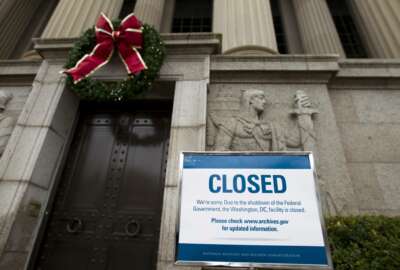

The EPA exempted more than 98 percent of its workforce for a partial government shutdown. But due to a funding lapse the agency closed most of its operations in...
The Environmental Protection Agency exempted more than 98 percent of its total workforce at the beginning of a partial government shutdown. But due to a continued lapse in funding, the agency closed most of its operations at the end of December, adding the majority of its workforce to the furloughed ranks of federal employees.
Loreen Targos, an EPA scientist who’s worked for the agency’s Great Lakes National Program Office since 2015, is on the hook for mortgage payments for the house she and her husband bought after getting married last September.
Targos, also a steward for the American Federation of Government Employees Local 704, said agency furloughs, which impact most of her coworkers, have put an added burden on paying bills.
“It was such a pain to buy the house in general,” she said in a phone interview Thursday.
Had there been other hurdles, such as any processing delays with the Federal Housing Administration loan Targos and her husband used to buy the house, she said they might not be living there currently.
However, people currently waiting for FHA loans in the middle of the shutdown may not be so lucky. According to the Department of Housing and Urban Development’s contingency plan, a “limited
number” of FHA staff will be available to endorse new loans. Due to limited staff, the guidance warns it may take longer to endorse new loans.
“Someone who relies on these programs to buy their first home is really at a disadvantage versus somebody who just has cash on hand,” Targos said. “This is hurting ordinary people disproportionally.”
About 380,000 federal employees sent home during the shutdown will likely receive back pay after Congress passes a spending bill that re-opens shuttered agencies, as will the roughly 420,000 exempted employees who continue to work during the shutdown without pay.
On Thursday, a bipartisan group of 30 senators introduced legislation that would guarantee back pay for federal employees after the shutdown ends.
The lapse in congressional appropriations has some EPA staff in a bind — like Targos‘ colleague who was sent to California as part of the agency’s response to the state’s wildfires.
“He’s experiencing tremendous difficulty,” she said about her coworker. “When we travel and there’s a government shutdown, there are airline tickets and hotel costs that are charged to our government credit card, but we are personally responsible for paying those.”
Citing the duration of the shutdown, Targos said the EPA canceled a Jan. 10 public meeting where agency scientists and engineers would’ve spoken to Chicago residents about the cleanup of a local Superfund site.
“What happens with a shutdown like this is who knows how long it will last,” Targos said. “It could really jeopardize projects, [or] at best delay them.”
Beyond the personal finance challenges of shutdown, Targos said it’s frustrating to not be able to do her job.
“We try to be good stewards of taxpayer money, and with things like this, how can we do our work in a cost-effective way, when we have to spend our time working on shutdown procedures, due to politics, rather than the jobs we were hired to do?”
Sarah Watterson, a furloughed office manager at the EPA’s Superfund division in Kansas City, said her children have noticed some of the spending cuts she’s made as a result of the shutdown.
“They’re on Christmas vacation, and they’re like, ‘Why don’t we have all these groceries in the house?’ And I’m like, ‘I had to keep it to the necessities,'” Watterson said. “It’s just nerve-wracking, because you’re trying to make the best decisions. You’re trying to make the responsible decisions, and hoping that this will end before you get down to the bare minimum.”
Per an Office of Personnel Management memo, Watterson, also president of AFGE Local 907, spoke to her landlord after making her January house payment, to discuss whether the shutdown would impact her ability to pay for next month.
“I talked to my landlord as I made the payment, and I said, ‘I can make this [payment] this month. If this continues, I don’t know what we’re going to do about next month. Can we make arrangements?’”
Watterson said her landlord understood the predicament and said he was “more than willing” to talk about alternate arrangements.



“They didn’t necessarily have all the answers, but they were willing to be there and sort of calm some of our concerns,” she said.
Watterson estimated about 20 of the 500 employees who work in her EPA Region 7 have been exempted, and have worked during the shutdown without pay.
While most employees have experienced several shutdowns during the span of their careers, at least one agency employee working in Region 7, who started work in December, got his first taste of the shutdown.
“He got one paycheck, and now he’s furloughed, Watterson said. “He moved from another state to take a job with us.”
In cases like that, Gary Morton, the president of AFGE Council 238, which represents more than 9,000 EPA workers, said the shutdown may have an adverse effect on employee retention.
“Some people might decide that this was not the career for them, where you have to go through a period of time every year – every couple of years – where you don’t work for a period of time,” Morton said.
Copyright © 2024 Federal News Network. All rights reserved. This website is not intended for users located within the European Economic Area.
Jory Heckman is a reporter at Federal News Network covering U.S. Postal Service, IRS, big data and technology issues.
Follow @jheckmanWFED
